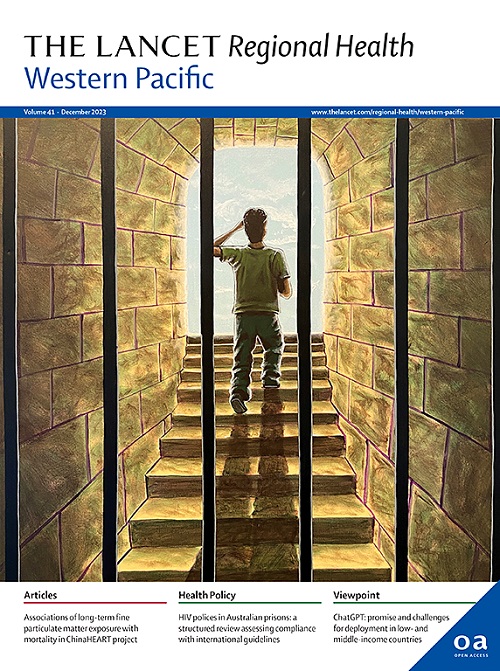The psychological impact of conflict in the Middle East from 2023 to 2025 on Australian communities: a prospective cohort study
IF 8.1
1区 医学
Q1 HEALTH CARE SCIENCES & SERVICES
引用次数: 0
Abstract
Background
There is a lack of empirical research on the mental health risks faced by populations living in high-income multicultural countries during a war in their country of origin. We examined mental health and psychosocial outcomes associated with a period during the 2023–2025 Middle East conflict (primarily involving Israel, Palestine and Lebanon) on Australian resident women including those who arrived from Lebanon, Gaza and other Palestinian Territories.
Methods
The mental health study assessed 410 Australian resident women at two points: one 12–18 months prior, and one period during the current Middle Eastern conflict extending from October 7, 2023, to December 2024. The three groups included those directly connected by birth or family to the conflict-affected regions: Lebanon, Gaza and other Palestinian territories (Middle East—LGP), Other Migrants not from the region, and Australian Born (AB) women with no connection to the region. Measures included the Mini-International Neuropsychiatric Interview to assess symptoms of panic disorder (PD), mood disorder (MDD), post-traumatic stress disorder (PTSD), separation anxiety disorder (SEPAD), Quality of Life, Worry about Family and Separation from Family overseas. Generalised linear mixed models and cumulative link mixed models were used to examine the trajectory of mental disorder symptoms over time for each group compared with the AB group. The analysis adjusted for age, marital status, financial difficulties, and COVID-19 stress.
Findings
Generalised linear and cumulative link mixed models revealed significant interaction effects, indicating that Middle East–LGP women experienced a significantly greater increase in PD symptoms (β = 1.26, SE = 0.54, p = 0.02) and poorer quality of life (β = 0.10, SE = 0.04, p = 0.009) from Time 1 to Time 2 compared to AB women. The Middle East—LGP women reported significantly greater increases in concerns about family overseas (log odds = 4.04, SE = 1.25, p = 0.001) and the ability to return home in an emergency (log odds = 3.41, SE = 1.20, p = 0.005).
Interpretation
This is a unique study of women’s mental health in a multicultural, high-income country, undertaken during conflict occurring in another region of the world. Panic Disorder symptoms, poorer quality of life and other psychosocial stress increased only in the group connected by migration to the conflict-affected region.
Funding
National Health and Medical Research Council, Australia (2018/GNT1164736).
2023 - 2025年中东冲突对澳大利亚社区的心理影响:一项前瞻性队列研究
生活在高收入多元文化国家的人口在其原籍国发生战争期间所面临的心理健康风险缺乏实证研究。我们研究了与2023-2025年中东冲突(主要涉及以色列、巴勒斯坦和黎巴嫩)期间有关的澳大利亚居民妇女的心理健康和社会心理结果,包括来自黎巴嫩、加沙和其他巴勒斯坦领土的妇女。方法心理健康研究在两个时间点对410名澳大利亚女性居民进行了评估:一个是在2023年10月7日至2024年12月中东冲突期间,另一个是在12-18个月前。这三个群体包括那些在出生或家庭上与受冲突影响地区有直接联系的人:黎巴嫩、加沙和其他巴勒斯坦领土(中东- lgp),非该地区的其他移民,以及与该地区没有联系的澳大利亚出生(AB)妇女。测量方法包括小型国际神经精神病学访谈,以评估惊恐障碍(PD)、情绪障碍(MDD)、创伤后应激障碍(PTSD)、分离焦虑障碍(SEPAD)、生活质量、对家庭的担忧和与海外家人分离的症状。使用广义线性混合模型和累积链接混合模型来检查与AB组相比,每组的精神障碍症状随时间的轨迹。该分析调整了年龄、婚姻状况、经济困难和COVID-19压力。研究结果:广义线性和累积关联混合模型显示了显著的相互作用效应,表明与AB女性相比,中东- lgp女性从时间1到时间2的PD症状明显增加(β = 1.26, SE = 0.54, p = 0.02),生活质量更差(β = 0.10, SE = 0.04, p = 0.009)。中东-低收入家庭妇女对海外家庭的担忧(对数比= 4.04,SE = 1.25, p = 0.001)和紧急情况下返回家园的能力显著增加(对数比= 3.41,SE = 1.20, p = 0.005)。这是在世界另一个地区发生冲突期间对一个多文化高收入国家妇女心理健康进行的一项独特研究。恐慌症症状、较差的生活质量和其他社会心理压力只在移徙到受冲突影响地区的人群中有所增加。资助:澳大利亚国家卫生和医学研究委员会(2018/GNT1164736)。
本文章由计算机程序翻译,如有差异,请以英文原文为准。
求助全文
约1分钟内获得全文
求助全文
来源期刊

The Lancet Regional Health: Western Pacific
Medicine-Pediatrics, Perinatology and Child Health
CiteScore
8.80
自引率
2.80%
发文量
305
审稿时长
11 weeks
期刊介绍:
The Lancet Regional Health – Western Pacific, a gold open access journal, is an integral part of The Lancet's global initiative advocating for healthcare quality and access worldwide. It aims to advance clinical practice and health policy in the Western Pacific region, contributing to enhanced health outcomes. The journal publishes high-quality original research shedding light on clinical practice and health policy in the region. It also includes reviews, commentaries, and opinion pieces covering diverse regional health topics, such as infectious diseases, non-communicable diseases, child and adolescent health, maternal and reproductive health, aging health, mental health, the health workforce and systems, and health policy.
 求助内容:
求助内容: 应助结果提醒方式:
应助结果提醒方式:


